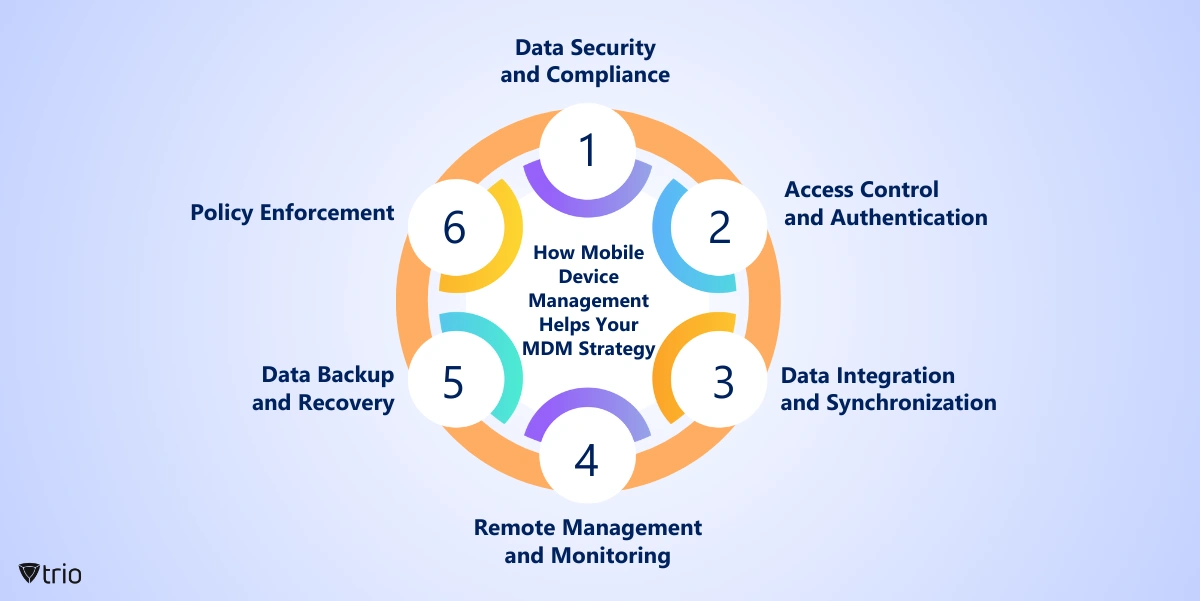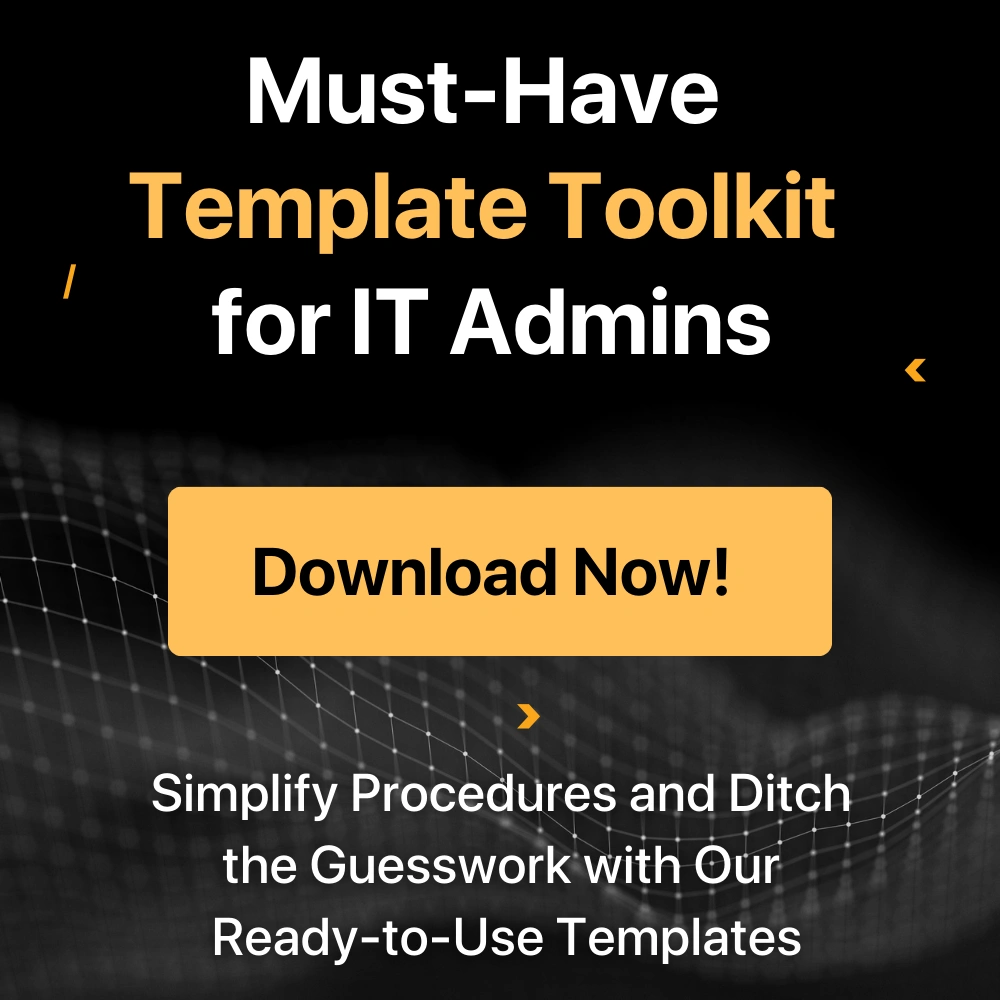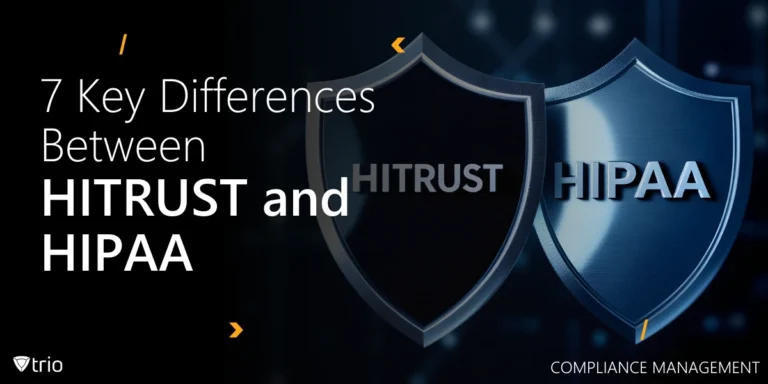Master Data Management (MDM) forms the backbone of organizational data integrity, ensuring accuracy and consistency across essential business entities. In this blog post, it’s essential to clarify that when we refer to MDM, we specifically mean Master Data Management, not to be confused with Mobile Device Management (also known as MDM). Now, let’s delve into the intricacies of MDM strategy for small businesses and explore how the integration of Mobile Device Management solutions can simplify and fortify these crucial processes.
How Does Master Data Management Work in the Context of Small Businesses?
Master data typically includes essential business entities such as customers, products, employees, suppliers, and other core entities that are shared across an organization. MDM aims to ensure that this data is accurate, consistent, and available across various systems and applications within the organization. Here are some master data and MDM strategy examples:
Customer Data:
Master Data: Customer names, addresses, and contact details.
MDM: Ensures consistency in customer information across all systems, preventing duplicate records and ensuring accurate customer profiles.
Product Data:
Master Data: Product descriptions, specifications, pricing.
MDM: Centralizes product information, making it easier to update, manage, and synchronize across various platforms, preventing discrepancies.
Employee Data:
Master Data: Employee names, roles, and contact information.
MDM: Manages employee data consistently, ensuring that HR systems, payroll systems, and other applications use accurate and up-to-date information.

Benefits of Master Data Management for Small Businesses
Data management strategy is important for several reasons, and its significance extends across various aspects of an organization. Though the benefits of MDM differ depending on the industry you work in, it is almost always crucial. Here are some key reasons why MDM is crucial:
-
Data Accuracy and Consistency
MDM ensures that master data, such as customer information, product details, and employee records, is accurate and consistent across all systems and applications. This helps in avoiding data errors, duplication, and discrepancies.
-
Improved Decision-Making
By providing a single, reliable source of truth for critical data, MDM enables better business decision-making. Organizations can make informed choices based on trustworthy and up-to-date information.
-
Operational Efficiency
MDM streamlines business processes by ensuring that data is consistently managed and available across different departments and systems. This leads to increased operational efficiency and reduced manual effort in data correction and reconciliation.
-
Compliance and Risk Management
Many industries have regulatory requirements regarding data accuracy and privacy. A good Master Data Management strategy helps organizations comply with these regulations by maintaining data integrity and providing a clear audit trail. It also reduces the risk of non-compliance penalties.
-
Customer Satisfaction
In customer-centric industries, having accurate and consistent customer data is essential for providing personalized and efficient services. MDM ensures that customer information is reliable, leading to improved customer satisfaction.
-
Supply Chain Optimization
For organizations involved in supply chain management, MDM helps in maintaining accurate supplier and product data. This, in turn, leads to better supply chain visibility, reduced errors in procurement, and improved relationships with suppliers.
-
Data Integration
MDM facilitates data integration across diverse systems and applications. It ensures that different departments within an organization can share and use data seamlessly, breaking down data silos.
-
Cost Savings
By preventing data errors, duplicates, and inconsistencies, MDM helps organizations avoid costly mistakes and rework. It also reduces the need for manual data correction efforts, leading to cost savings.
-
Strategic Initiatives
MDM supports strategic initiatives such as mergers, acquisitions, and digital transformations by providing a unified view of critical data. It helps in the smooth integration of new systems and data sources.
-
Data Governance
MDM is closely tied to data governance, establishing policies and procedures for data management. This ensures that data is treated as a valuable asset with proper controls, access rights, and quality standards.
How Mobile Device Management Solutions Can Help Your MDM Strategy
Mobile Device Management solutions play a crucial role in supporting a business’s Master Data Management (MDM) strategy by ensuring the secure and efficient management of mobile devices within the organization. Here are some ways Mobile Device Management solutions contribute to an effective Master Data Management plan:

-
Data Security and Compliance
MDM solutions help enforce security policies on mobile devices, ensuring that sensitive business data is protected. They enable encryption, remote wipe, and other security measures to safeguard data in case a device is lost or stolen. Compliance with data protection regulations becomes easier through centralized control over device security settings.
-
Access Control and Authentication
MDM tools enable organizations to implement access controls, user provisioning, and multi-factor authentication on mobile devices, ensuring that only authorized personnel can access critical business data. This helps maintain the integrity of master data by preventing unauthorized access and potential data breaches. Access provisioning ensures that users have the appropriate level of access to resources and applications based on their roles and responsibilities within the organization, further enhancing security and compliance.
-
Data Integration and Synchronization
MDM solutions facilitate the integration and synchronization of master data across various enterprise systems. Mobile devices can access and update master data in real-time, ensuring that the information remains consistent and up-to-date across the organization.
-
Remote Management and Monitoring
MDM allows administrators to remotely manage and monitor mobile devices from a centralized console. This capability is essential for tracking device performance, identifying issues, and ensuring that devices comply with organizational policies.
-
Data Backup and Recovery
MDM solutions often include features for regular data backups, making it easier to recover critical master data in the event of data loss or device failure. This contributes to the overall resilience and continuity of the MDM strategy.
-
Policy Enforcement
MDM tools allow organizations to enforce policies related to data usage, storage, and access on mobile devices. This helps in maintaining consistency in how master data is handled across the organization, promoting data quality and adherence to business rules.
Conclusion
In conclusion, the synergy between Master Data Management (MDM) and Mobile Device Management solutions is paramount for small businesses aiming to enhance data governance and operational efficiency. MDM plays a pivotal role in maintaining accurate, consistent, and accessible master data, fostering improved decision-making, compliance, and customer satisfaction. This especially holds true if your organization keeps master data management best practices in mind. Mobile Device Management seamlessly complements MDM by addressing the unique challenges posed by mobile devices, ensuring data security, access control, and synchronization. The amalgamation of these strategies not only fortifies data integrity but also empowers organizations to navigate the evolving landscape of digital business with confidence and resilience.
See Trio in Action: Get Your Free Trial Now!
We recommend you use Trio to enhance your MDM strategy. Trio is a Mobile Device Management solution. With a centralized platform for managing all endpoints, Trio is an ideal solution for organizations with a diverse device fleet running on different operating systems. You can try out all of Trio’s features by beginning your free trial today!
Get Ahead of the Curve
Every organization today needs a solution to automate time-consuming tasks and strengthen security.
Without the right tools, manual processes drain resources and leave gaps in protection. Trio MDM is designed to solve this problem, automating key tasks, boosting security, and ensuring compliance with ease.
Don't let inefficiencies hold you back. Learn how Trio MDM can revolutionize your IT operations or request a free trial today!




